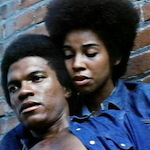 “My dad died fighting Nazis in Germany, but he died fightin the wrong ones, huh?”
“My dad died fighting Nazis in Germany, but he died fightin the wrong ones, huh?”
THE FINAL COMEDOWN is a 1972 drama starring Billy Dee Williams as an angry young militant who leads some sort of small uprising. It has been categorized as blaxploitation, and that makes sense – it’s a low budget movie with a funky soundtrack, and a sex scene (maybe to please producer Roger Corman), and it co-stars that bad D’Urville Martin (director of DOLEMITE, played by Wesley Snipes in DOLEMITE IS MY NAME) and Raymond St. Jacques right after COOL BREEZE. But despite having many bullets fired and quite a few falling-off-a-building stunts, it’s not exactly an action movie or empowerment fantasy. It’s a very earnest issue movie, with the unvarnished rage and radicalism of THE SPOOK WHO SAT BY THE DOOR, plus an editing style and non-linear storytelling that seems more in the arty vein of stuff like SWEET SWEETBACK and TOP OF THE HEAP than all the ones that were trying to cash in on the success of SHAFT and SUPER FLY.
Williams had been on a bunch of TV shows for a while, but had raised his profile the year before by starring with James Caan in the popular TV movie BRIAN’S SONG. Most of THE FINAL COMEDOWN is about him bleeding out and remembering the events that led to it, but he’s already having flashbacks before that. The cold open is him playing football as a kid, something he’s remembering after waking up sweaty in a hide-a-bed, in a room with posters of Angela Davis and Huey P. Newton hung up and a rifle leaning against the wall.
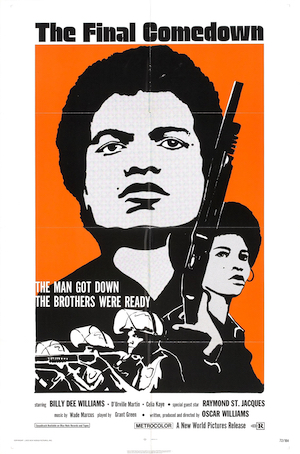 Johnny’s morning routine is intercut with many things: a little girl sleeping and having her doll stolen by a rat, a white guy going to open his shop, Johnny’s mom going to her job as a maid, Johnny and other militants making phone calls, polishing guns, reciting the Declaration of Independence while posing with guns, getting shot in the head by cops, smiling white people having a nice meal together outdoors, the militants getting chased and cornered in an alley. Johnny gets shot before it dissolves back to him as a kid playing football… and this time we see that he’s looking grimly over at some bushes where two white cops are pinning down a Black woman, covering her mouth. The contrastingly upbeat soundtrack – composed by Motown arranger/producer Wade Marcus and performed by guitar great Grant Green – continues to groove as the title and credits appear over motionless images from a pause in the shootout – dead militants laying on concrete and on apartment stairs, dead cops next to blood-stained brick walls and hanging over ledges, still clutching their guns, a bystander dead in a car, kids watching from a window, armies of helmeted cops still lined up on roofs and behind dumpsters.
Johnny’s morning routine is intercut with many things: a little girl sleeping and having her doll stolen by a rat, a white guy going to open his shop, Johnny’s mom going to her job as a maid, Johnny and other militants making phone calls, polishing guns, reciting the Declaration of Independence while posing with guns, getting shot in the head by cops, smiling white people having a nice meal together outdoors, the militants getting chased and cornered in an alley. Johnny gets shot before it dissolves back to him as a kid playing football… and this time we see that he’s looking grimly over at some bushes where two white cops are pinning down a Black woman, covering her mouth. The contrastingly upbeat soundtrack – composed by Motown arranger/producer Wade Marcus and performed by guitar great Grant Green – continues to groove as the title and credits appear over motionless images from a pause in the shootout – dead militants laying on concrete and on apartment stairs, dead cops next to blood-stained brick walls and hanging over ledges, still clutching their guns, a bystander dead in a car, kids watching from a window, armies of helmeted cops still lined up on roofs and behind dumpsters.
Johnny seems to be the leader. Word spreads that he’s hurt bad, so Billy Joe (Martin) and the boys go kidnap a doctor (Ed Cambridge, TROUBLE MAN, HIT MAN, George Washington Carver in BILL & TED’S BOGUS JOURNEY) to see to his wounds.
Some white bystanders behind the police line ask if Johnny is all right, and a Black cop says, “I hope the sonofabitch is dead.” The white lady Renee (Celia Kaye, DON’T BE AFRAID OF THE DARK, who later married John Milius) flashes back to being in bed with Johnny and getting a post-coital lecture about her not believing in guns and the white privilege of being able to “drop out” and be a hippie and “by the time you hit 30, you’re gonna drop back in, ‘cause you didn’t do nothin but talk that brotherhood, love and peace. You didn’t change nothin.”
Meanwhile Johnny sits bleeding in an alley, having his own flashbacks – arguing about internalized racism with his mom (Maidie Norman, WRITTEN ON THE WIND, HALLOWEEN III: SEASON OF THE WITCH) and dad (Morris D. Erby, THE LOST MAN, THX 1138), planning this action with Renee’s brother Michael (Billy Durkin, THE SEVEN MINUTES). The idea was to lead the cops uptown because “We gotta get it together and take it to the white part of the city – my folks have to see it.” But apparently “them white boys” didn’t do “what they were supposed to do,” so Johnny’s cornered in his own neighborhood just like he predicted.
He remembers picking up his dad at his job shining white men’s shoes, and his girlfriend Luanna (Pamela Jones, BUCK AND THE PREACHER) remembers their courtship after he saw her leading kids in stretching in the building where he was meeting with a militant leader (St. Jacques). He remembers putting on a tie for a job interview and being told he has the job until another white dude walks in and says the job isn’t available. Also he remembers cops arresting him for allegedly stealing his own car. He recently bought it used from a shopkeeper who confirms his story. “The white man is telling you what I just told you, now maybe you’ll listen,” Johnny says. When said white man is even more outraged than he is, and berates the cops for stopping an innocent man and seizing his property, one of them says, “You’re Jewish, aren’t you?” It feels simultaneously on the nose (convenient that he throws in some apropos of nothing anti-semitism along with his anti-Black racism) but also pretty effective in the way it implies the man’s reason for taking it so personally. Johnny actually seems to appreciate white allies other than Renee – he was pretty hard on her.
There are so many more memories. He remembers a friend shooting up, and the friend has a ‘Nam flashback within his flashback. Michael watches a cop kill a guy and then remembers arguing with his dad after having Johnny over for dinner. Dad argues with Johnny by saying, “We have a democratic process, don’t you go to the polls?” (yes, and that has not worked so far), and then after he leaves wants to call the cops to “put a check on him.” When Billy Joe goes out in a blaze of glory he flashes back to meeting Johnny when they were laughing about being rejected by the same “equal opportunity employer.”
“I’m underqualified and you’re overqualified – ain’t the white man a bitch with his shit?”
In the end the well-meaning white kids make it past the police line and through a makeshift barricade just to say, “Johnny, brother, let’s get out of here!”
He looks at them aghast and asks “Damn it, where’s your gun?” right as the cops use this opening to shoot him again. And also his mom. Then the cops give them 30 seconds to come out and, it’s implied, execute all of them. The end. No end credits.
So other than the music this is a gloomy experience. Sure, there’s some colorful 70s time capsule stuff: a cool house party, a scene where he tries on daishikis at a boutique.
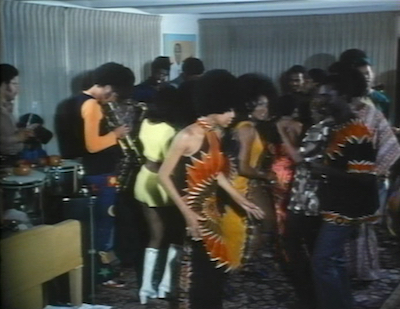
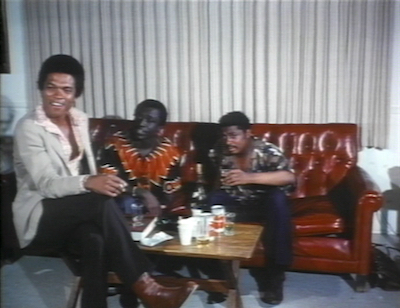
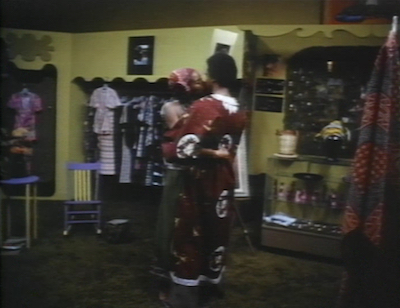
But basically all the issues it’s raging about are still prevalent in the world today: income inequality, employment discrimination, police brutality, younger generations who want to make a change being shut out by their more conservative parents (both Black and white), white liberals sincerely wanting to help but not knowing how or being as willing to sacrifice. A particularly brutal part is when a Black doctor, who was brought there against his will, is shot dead with his hands up yelling “Don’t shoot, I’m a doctor!” It could be argued that it’s manipulative in the movie, but it would be hard to argue that shit like that doesn’t happen.
This is definitely a movie that’s more interesting than entertaining. The style of acting is at times theatrical – lots of emotional yelling scenes – but Williams is quite good, in a role that’s very different from his later Mr. Smooth persona. I think what would really improve the movie would be if they had a good, coherent plan and there was some tension about whether or not they could pull it off. If I understand correctly their plan was just to provoke the cops to come down hard on them and fight back. I don’t really understand how it was supposed to change people’s minds. That’s unfortunate for the movie, and unfortunately for society we’re still looking for ideas.
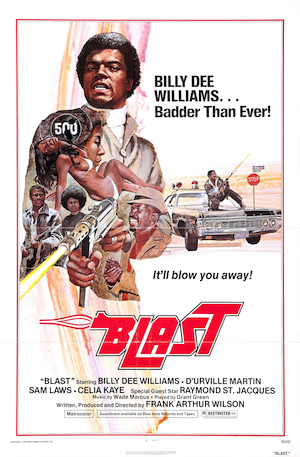 This is the first of four films from director Oscar Williams. He also wrote it, crediting a play as inspiration (“and JIMMY GARRETT, From His Play, WE OWN THE NIGHT, This Film Was Born.”) The version I watched is the original, available in a not-so-pristine transfer on DVD from the Film Detective label, and also on Tubi. But I read that there’s another version – it was released as BLAST! in 1976, with some new footage directed by Allan Arkush (ROCK ’N’ ROLL HIGH SCHOOL). On an episode of Trailers From Hell Arkush calls it “a movie I directed a third of” and explains that Corman had him rewrite, recut and reshoot THE FINAL COMEDOWN to make it into a new movie, because it hadn’t made back its money but Billy Dee had since become a big star in LADY SINGS THE BLUES. Arkush had to shoot “a half hour of solid action,” but they couldn’t afford Williams, so the new scenes star D’Urville Martin. Arkush says he called Oscar Williams about it and “he was a real gentleman” and was paid to work on the outline with him and make sure it kept its Black Power message. But when they released BLAST!, filmgoers quickly figured out they’d already seen it and wanted their money back.
This is the first of four films from director Oscar Williams. He also wrote it, crediting a play as inspiration (“and JIMMY GARRETT, From His Play, WE OWN THE NIGHT, This Film Was Born.”) The version I watched is the original, available in a not-so-pristine transfer on DVD from the Film Detective label, and also on Tubi. But I read that there’s another version – it was released as BLAST! in 1976, with some new footage directed by Allan Arkush (ROCK ’N’ ROLL HIGH SCHOOL). On an episode of Trailers From Hell Arkush calls it “a movie I directed a third of” and explains that Corman had him rewrite, recut and reshoot THE FINAL COMEDOWN to make it into a new movie, because it hadn’t made back its money but Billy Dee had since become a big star in LADY SINGS THE BLUES. Arkush had to shoot “a half hour of solid action,” but they couldn’t afford Williams, so the new scenes star D’Urville Martin. Arkush says he called Oscar Williams about it and “he was a real gentleman” and was paid to work on the outline with him and make sure it kept its Black Power message. But when they released BLAST!, filmgoers quickly figured out they’d already seen it and wanted their money back.
There doesn’t seem to be much writing about Oscar Williams, so the most information I could find was on his Linkedin page, which says he was born in the U.S. Virgin Islands (where he lives now), but he grew up in New York City, then moved to Los Angeles to make movies. He names his primary influence as Akira Kurosawa, “whose work shows how cinema can instruct as you entertain.”
Williams made THE FINAL COMEDOWN with a production grant from the American Film Institute, and followed it with FIVE ON THE BLACK HAND SIDE (1973), HOT POTATO (1976) starring Jim Kelly, and DEATH DRUG, a.k.a. THE WACK ATTACK (1978), starring Philip Michael Thomas. Perhaps more notably he wrote two of my favorites, TRUCK TURNER and BLACK BELT JONES (both 1974). After his stint in the industry he taught film production at USC for 14 1/2 years. I wonder if he showed his students THE FINAL COMEDOWN?


























February 14th, 2023 at 8:03 am
Hmmmmm… Maybe I should finally seek this out and watch it. Back in the ’90s, when everybody suddenly decided they were going to become ‘crate diggers’ and have fruitful careers as rap producers, DJs, or both, ’70s Grant Green records that would normally be sold for $2 (because jazz guys thought they were terrible, sell-out garbage) were selling for $50. And being an enterprising youngster, I knew of two sealed copies of this soundtrack for a couple bucks apiece in this moldy, dusty used shop with erratic hours of operation, deep in the hood where the diggers feared to tread.
As the owner/operator was ringing me out, he stared at me for what seemed to be full minute while puffing his pipe, then finally said:
“Shitty movie produces the worst Grant Green record Blue Note ever put out, and you want two of them?”
He actually waited for a response, and I didn’t know what to say. So I finally just said:
“I never saw the movie…”
“And you want the soundtrack? Two of them?”
“I like Grant Green. And one’s for a friend.”
“Then you’re a shitty friend!” He was almost yelling at this point. “I got six, seven actually good Grant Green records. And you buy this piece of shit, from this piece of shit movie? I know you said you never seen it. Well, don’t! Do one smart thing in your life!”
Again, this wasn’t rhetorical, he sat there and waited for a response.
“I don’t have much money”
“Well, here!” He put them in a bag and threw them across the counter. “Don’t spend what little you got on these”
So, to repay him for his–uh–generosity. I vowed to do one smart thing and not see the movie. But honestly, reading this review makes it seem kinds good?
I don’t know, the guy’s probably dead anyway. He probably had a heart attack while someone was trying to purchase a copy of the Cornbread, Earl and Me soundtrack.